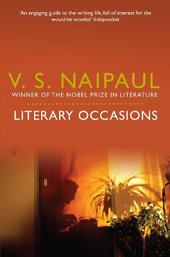
|
Literary Occasions: Essays
Paperback / softback
Main Details
| Title |
Literary Occasions: Essays
|
| Authors and Contributors |
By (author) V. S. Naipaul
|
| Physical Properties |
| Format:Paperback / softback | | Pages:224 | | Dimensions(mm): Height 197,Width 130 |
|
| Category/Genre | Literary essays |
|---|
| ISBN/Barcode |
9780330522977
|
| Classifications | Dewey:824.914 |
|---|
| Audience | |
|---|
|
Publishing Details |
| Publisher |
Pan Macmillan
|
| Imprint |
Picador
|
| Publication Date |
17 June 2011 |
| Publication Country |
United Kingdom
|
Description
From a master of the English language comes this astonishing collection of essays about reading, writing, and identity. In these eleven extended pieces V. S. Naipaul charts more than half a century of personal enquiry into the mysteries of the written word and of fiction in particular. Here are his boyhood experiences of reading books and his first youthful efforts at writing them; the evolution of his ideas about the extent to which individual cultures shape identities and influence literary forms; observations on Conrad, his literary forebear; the moving preface he wrote to the only book his father ever published; and his reflections on his career, ending with his celebrated Nobel lecture, 'Two Worlds'. A remarkable companion piece to The Writer and the World, Naipaul's previous volume of highly acclaimed essays, Literary Occasions is a stirring contribution to the fading art of the critic, and a revelation of a life in letters.
Author Biography
V. S. Naipaul was born in Trinidad in 1932. He went to England on a scholarship in 1950. After four years at University College, Oxford, he began to write, and since then has followed no other profession. He has published more than twenty books of fiction and non-fiction, including Half a Life, A House for Mr Biswas, A Bend in the River and most recently The Masque of Africa, and a collection of correspondence, Letters Between a Father and Son. In 2001 he was awarded the Nobel Prize in Literature.
ReviewsAn engaging guide to the writing life, full of interest for the would-be novelist. * Independent * He is an exceptionally good and perceptive critic - a few passages on Dickens are worth whole books by others - and when he addresses the art of fiction he not only writes beautifully (as always) but with complete humility. * New Statesman * The writing itself is a wonder of clarity, complex ideas given shape in simple English, and achieving that most difficult of tasks - having writer and reader seem simultaneously to be making the same journey. * New York Times Book Review *
|